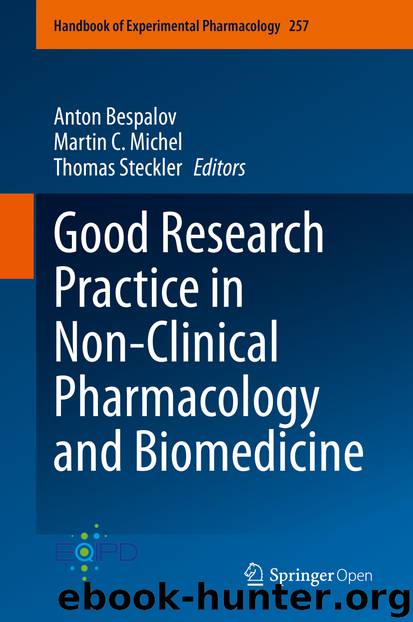Good Research Practice in Non-Clinical Pharmacology and Biomedicine by Anton Bespalov & Martin C. Michel & Thomas Steckler

Author:Anton Bespalov & Martin C. Michel & Thomas Steckler
Language: eng
Format: epub
ISBN: 9783030336561
Publisher: Springer International Publishing
4 Anaesthesia and Analgesia
For numerous animal experiments such as surgeries or imaging studies, the use of anaesthetics and analgesics in order to reduce animal suffering from pain and distress is an ethical obligation and crucial to the 3Rs concept (Carbone 2011). However, it is known that these drugs (as well as untreated pain itself) can severely affect the animals’ biology and physiology, thereby influencing experimental data and introducing variability into research outcomes. Focusing on animal pain management means both an issue of generating high-quality, reproducible data and a substantial animal welfare concern. Dealing with this ethical and methodological conflict can pose a challenging task for scientists.
The ARRIVE guidelines recommend the reporting of anaesthesia and analgesia in order to achieve a full and detailed description of the experimental procedures performed in preclinical animal studies and to allow the critical evaluation and reproduction of published data. However, there is evidence that the current scientific literature lacks important details concerning the use of animal anaesthetics and analgesics, underestimating their potential interference with experimental results (Carbone and Austin 2016; Uhlig et al. 2015). In many cases, it is not clear whether scientists actively withhold treatment of animals with anaesthetic or analgesic drugs or just fail to include this information in the reporting, perhaps due to assumed insignificance to the experimental outcome. This creates the false impression that the selection of appropriate anaesthetic and analgesic regimens is not considered as a crucial methodological concern for generating high-quality research data. Furthermore, under-reporting of anaesthesia and pain management may also shape ongoing practice among researchers and encourage under-treatment of animals, which represents a serious problem concerning animal welfare.
Surgical pain and insufficient analgesia act as stressors and can elicit various effects on the animals’ immune system, food and water consumption, social behaviour, locomotor activity as well as metabolic and hormone state, among others, which may all influence the experimental outcomes of animal studies (Leach et al. 2012; Liles and Flecknell 1993). The use of anaesthetics and analgesics relieves surgical pain, thus contributing to the refinement of the experimental methods. Additionally, following the surgical procedure, an appropriate long-term pain management, which could last for several days, is required to ensure animal wellbeing. However, anaesthetic and analgesic drugs themselves may also confound experimental results, e.g. by regulating inflammatory pathways or exerting immunomodulatory effects (Al-Hashimi et al. 2013; Fuentes et al. 2006; Galley et al. 2000; Martucci et al. 2004). In cancer studies on tumour metastasis in rats, it has been shown that analgesic drugs such as tramadol are able to prevent the effect of experimental surgery on natural killer cell activity and on the enhancement of metastatic diffusion, which needs to be taken into account when using this kind of animal model (Gaspani et al. 2002). Furthermore, as demonstrated for inhalation anaesthesia using sevoflurane in rats, the expression of circadian genes may be severely influenced, which needs to be borne in mind in the design of animal studies analysing gene expression (Kobayashi et al. 2007).
As indicated in these few examples,
Download
This site does not store any files on its server. We only index and link to content provided by other sites. Please contact the content providers to delete copyright contents if any and email us, we'll remove relevant links or contents immediately.
Periodization Training for Sports by Tudor Bompa(8254)
Why We Sleep: Unlocking the Power of Sleep and Dreams by Matthew Walker(6706)
Paper Towns by Green John(5179)
The Immortal Life of Henrietta Lacks by Rebecca Skloot(4580)
The Sports Rules Book by Human Kinetics(4379)
Dynamic Alignment Through Imagery by Eric Franklin(4208)
ACSM's Complete Guide to Fitness & Health by ACSM(4057)
Kaplan MCAT Organic Chemistry Review: Created for MCAT 2015 (Kaplan Test Prep) by Kaplan(4009)
Introduction to Kinesiology by Shirl J. Hoffman(3766)
Livewired by David Eagleman(3765)
The Death of the Heart by Elizabeth Bowen(3610)
The River of Consciousness by Oliver Sacks(3599)
Alchemy and Alchemists by C. J. S. Thompson(3516)
Bad Pharma by Ben Goldacre(3422)
Descartes' Error by Antonio Damasio(3271)
The Emperor of All Maladies: A Biography of Cancer by Siddhartha Mukherjee(3155)
The Gene: An Intimate History by Siddhartha Mukherjee(3095)
The Fate of Rome: Climate, Disease, and the End of an Empire (The Princeton History of the Ancient World) by Kyle Harper(3055)
Kaplan MCAT Behavioral Sciences Review: Created for MCAT 2015 (Kaplan Test Prep) by Kaplan(2984)
